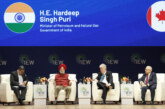World Health Day 2012
World Health Day is celebrated on 7 April to mark the anniversary of the founding of WHO in 1948. Each year a theme is selected for World Health Day that highlights a priority area of concern for WHO. World Health Day is a global campaign, inviting everyone – from global leaders to the public in all countries – to focus on a single health challenge with global impact.
The WHO organizes international, regional and local events on the Day related to a particular theme. Resources provided continue beyond 7 April, that is, the designated day for celebrating the World Health Day. The topic of World Health Day in 2012 is Ageing and health with the theme “Good health adds life to years”. The focus is how good health throughout life can help older men and women lead full and productive lives and be a resource for their families and communities.
World Health Day is acknowledged by various governments and non-governmental organizations with interests in public health issues, who also organize activities and highlight their support in media reports, such as through press releases issued in recent years by U.S. Secretary of State Hillary Rodham Clinton and the Global Health Council. Different activities are being organized by WHO as well as non-governmental and community organizations like Yogathon (an Art of Living Initiative) – a marathon of Surya Namaskar – is scheduled to happen in 100+ cities across the globe. Millions of people are expected to participate in that event to make awareness of Yoga as a part of healthy living.
Key points
1. Population ageing is a global phenomenon that is now occurring fastest in
low- and middle-income countries
2. Population ageing is inextricably linked with socioeconomic development.
3. While ageing presents challenges to society, it also creates many opportunities.
4. Fostering good health in older age is central to the global response to
population ageing.
5. Poor health in older age is not just a burden for the individual but also for their families and for society as a whole. The poorer the family or the setting, the greater the potential impact.
6. The main health challenges for older people are noncommunicable diseases.
The impact of these conditions is two to three times greater for older people
in low- and middle-income countries than for people in high-income countries.
7. Current health systems, particularly in low- and middle-income countries, are poorly designed to meet the chronic care needs that arise from this complex burden of disease.
8. Ageing is interrelated with other major global trends such as urbanization,
Technological change and globalization.
9. Increasing longevity may even lead us to rethink the way we view “old” itself.




